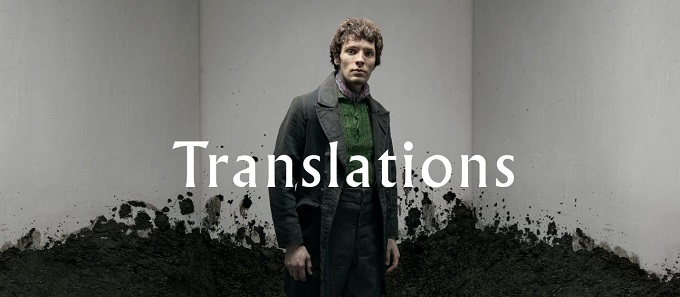
Translations is set in Donegal in the 1830s. Ireland is under British control, but most of the population do not speak English. It is at a time before the famine has set in, but people know of the blight and are aware of the damage that a potato crop failure can do to a community. Ordinance Survey has sent teams of men to map the countryside and to standardise place names. Education had not been allowed for Catholics, so the practice of illegal hedge schools operated throughout Ireland. One of these schools is the precise setting of this play.
This is a play about language, the effect language can have on culture, how we can communicate with it and also about how we can communicate without it. This makes it quite an intimate piece and the Oliver Theatre, The National Theatre’s largest space and stage, does not appear to be a natural home for it. However, Rae Smith, the set designer has done an amazing job and used the space to great advantage. The hedge school is a small, low walled area right at the front of the stage and the rest of the area is peat bog stretching out into the distance, covered by the gently rolling mist that is prevailing climate of the region. Thus, we have the intimacy of the small school and the expanse of the area that is in the process of being mapped.

Brian Friel was, he died in 2015, a wonderful playwright and Translations is a virtuoso display of his skills. The play itself may be about the power of words but the main love scene is between two people without a common language. It consists mostly of lists of place names, and is still a very moving piece of theatre. The director, Ian Rickson, has taken great care of the action, every entry and exit feels considered and the lines are all delivered deliberately, making you feel that each word has been carefully chosen.
The acting is of the highest calibre, Ciaran Hinds is as good as you would expect – and those expectations are high indeed. Colin Morgan is also very good, showing that he is aware that he is taking both sides, while denying it to all. Dermot Crowley, as Jimmy Jack Cassie, is a revelation, in a part as a humorous fantasist, who has to be credible to be funny. I also loved Michelle Fox, who managed to get us to feel a wide range of emotions even though her part has very few lines.
The thing that makes this production stand out for me, though, is the extraordinary way that Ian Rickson handles the final scene. The mechanism he employs, comes out of the blue and is gone in a flash, it adds a current reference to the play and suits it well. All in all, this is a beautiful piece of writing, beautifully presented and performed and I will consider myself to be very lucky if I see anything as good this year.
Sounds like a great production. You may be right about it needing to be in a smaller space though, sometimes these personal intense plays require a more compact theatre.
LikeLiked by 2 people
It’s true, often they do, this one made the transition remarkably well.
LikeLiked by 1 person
A great play. Friel could conjure magic. Regards Thom
LikeLiked by 1 person
He could and this is a great production.
LikeLiked by 1 person